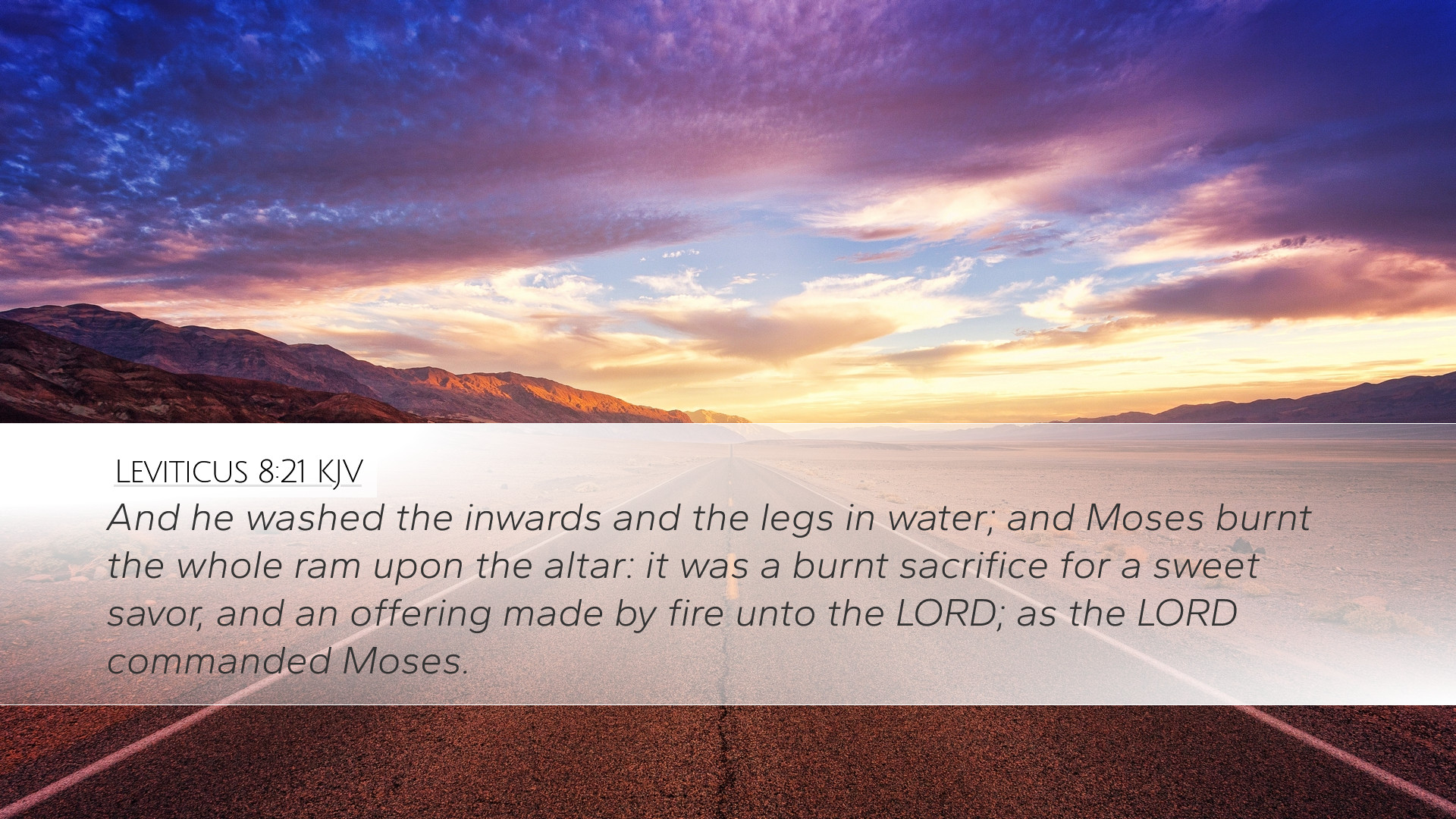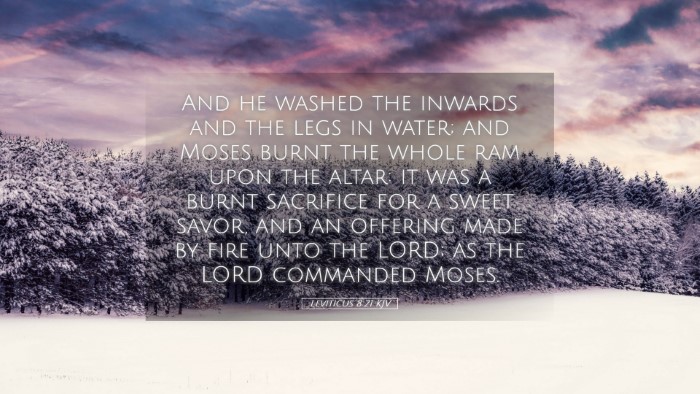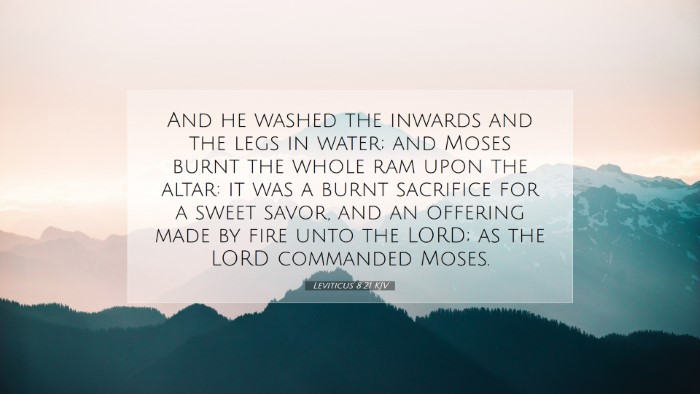Commentary on Leviticus 8:21
Verse: Leviticus 8:21 - "And he washed the inwards and the legs in water: and Moses burnt the whole ram upon the altar: it was a burnt offering for a sweet savour, and an offering made by fire unto the Lord; as the Lord commanded Moses."
Introduction
This verse is a part of the ceremonial ordination of Aaron and his sons as priests, where the detailed regulations for their consecration and the offerings they would present to God are meticulously outlined. The events leading to this moment provide immense insight into the holiness required in service to God and reflect on the sacrificial system established in the Mosaic Law.
Overview of the Sacrifice
This particular passage emphasizes the act of the burnt offering, a crucial aspect of the sacrificial system in ancient Israel. A burnt offering involved completely consuming the sacrifice by fire on the altar, signifying total dedication to God and the seeking of His favor.
The Symbolism of the Sacrifice
- Washing of the Inwards and Legs: The washing signifies cleansing and preparation before the offering could be made. This represents the necessity of purity in approaching God, reinforcing the broader biblical principle that God’s servants must be pure in heart and action (Matthew Henry).
- Burnt Offering: The entire ram being burnt represents total surrender and commitment to God. This act illustrates the principle that true worship involves total self-offering, as reflected in Romans 12:1, where believers are urged to present their bodies as living sacrifices (Albert Barnes).
- Sweet Savour: The term 'sweet savour’ speaks to the acceptance of the offering by God. This indicates that the worship seen here pleases the Lord and signifies His acceptance of the burnt offering as a means of atonement (Adam Clarke).
The Role of Moses
Moses acts as the mediator who carries out the commands of God regarding the priesthood. His obedience is paramount in establishing the covenantal relationship between God and Israel. The act of burning the ram underscores that Moses is not merely a passive observer but an active participant in fulfilling God's directives (Matthew Henry).
Spiritual Implications of Mediation
- Priestly Mediation: Moses mediates between God and the people, foreshadowing the ultimate mediator, Jesus Christ. This parallel is critical in understanding the priestly functions and their fulfillment in Christ (Albert Barnes).
- Obedience to Divine Command: The repeated phrase “as the Lord commanded” illustrates the importance of adhering strictly to God's commands in worship and service, which is vital for spiritual leaders today (Adam Clarke).
Theological Reflections
The ordination of Aaron and his sons represents a pivotal moment for Israel, emphasizing the need for sanctity and order in worship. Leviticus 8:21 serves not just as a historical account but as a theological foundation that illustrates key doctrines relevant to Christian faith, such as atonement, holiness, and the necessity of divine approval in worship.
Holiness and Divine Approval
- Call to Holiness: The ritual act illustrates that God desires holiness in His people—a standard that remains pertinent for contemporary believers (Matthew Henry).
- Role of Atonement: The sacrifice exemplifies atonement’s necessity in approaching God, reinforcing New Testament teachings on reconciliation through Christ (Albert Barnes).
Application for Today
For pastors and theologians, this verse challenges modern Christian practice in areas such as worship, sacrifice, and the pursuit of holiness. The principles illustrated can apply to various aspects of congregational life and personal faith.
Contemporary Worship Practices
- Emphasis on Purity: Just as the offerings required inward cleansing, today’s believers are encouraged to seek purity in their lives before approaching God in worship. Regular self-examination and accountability are crucial in this journey (Adam Clarke).
- Whole-hearted Commitment: The burnt offering serves as a reminder that worship demands comprehensive involvement; believers are called to offer their lives as living sacrifices, indicative of total dedication (Albert Barnes).
Leadership and Obedience
- Example of Pastoral Leadership: Like Moses, church leaders are to model obedience to God’s commands, ensuring that their ministry is conducted in accordance with biblical standards (Matthew Henry).
- The Significance of Mediation: In understanding Christ’s role as our High Priest, believers can appreciate the significance of mediatory prayer and intercession in the life of the church (Albert Barnes).
Conclusion
In summary, Leviticus 8:21 encapsulates profound truths surrounding worship, sacrificial atonement, and the holiness required by God. The insights derived from historical and theological perspectives contribute to a deeper understanding of the passage’s relevance for faith communities today. Pastors, students, theologians, and scholars are invited to explore these themes, applying them to their spiritual lives and ministries as they seek to honor God through their worship.


